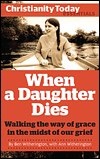My husband asked me recently if I've ever been angry with God. It only took me a few seconds to answer, "Yes—when my dad died." His question flooded my emotions with the same anger I felt years ago that I still have to work through occasionally.
When I became a Christian as a teenager, the person who led me to Christ told me to pray for my parents, since they didn't know God. I threw myself passionately into that task. I clung to verses such as 1 John 5:14-15, "This is the confidence we have in approaching God: that if we ask anything according to his will, he hears us. And if we know that he hears us—whatever we ask—we know that we have what we asked of him."
I reasoned that it's certainly God's will that my parents come to Christ, so I never doubted that it would happen. I thought that I may have been placed in this family just so I could pray for them. I gained courage from hearing testimonies time after time of someone who prayed for a loved one for years and finally saw a remarkable conversion. I never heard anyone speak of praying for a loved one who didn't receive Christ.
I had a great relationship with my father. He was 42 when I was born and had raised four other children by the time I'd come along, so he'd mellowed and appreciated the chance to parent again. He was the kind of dad most girls dream of. He taught me to dance and ice skate, sang me songs, and quoted me poetry. We were very much alike in personality, so we understood each other's humor, loved to debate every subject under the sun, and were always ready for a new adventure (much to my poor, loved-to-stay-at-home mother's chagrin). I adored my dad.
So when he was diagnosed with cancer, I was sad. I didn't want to see him suffer. But that didn't make me angry with God. I understood that we live in a fallen world and that our bodies wear out one way or another. I prayed for healing, but I don't think I really expected it to be answered. My dad had the kind of cancer that has no cure, and he was in his 70s, so I felt blessed to have him as long as I did.
My sister, my husband, and I had some opportunities to share Christ with my dad as he suffered with cancer for the next six years. He always listened politely and said that he'd think about what we said. We prayed fervently and waited expectantly to hear his confession of faith.
My anger came in the hospital when he was dying. Toward the end, my husband, sister, and I were in the room alone with my dad. My husband began to encourage my dad, who was filled with morphine because of all the pain he was in, to surrender his life to Christ. My sister heartily agreed, and my dad cried, "No, no, leave me alone!" I patted his hand and tried to comfort him, but the conversation was over. I was so horrified that I couldn't look at my husband or sister. I felt like someone had literally squeezed my heart with their fist.
When I left the room, I got angry. I wanted to kick the bed and punch my fist through the wall, but mostly I wanted to pummel God. I'd prayed my entire life for this? Not only did I have no reassurance that my father had become a Christian, but I had this cry of rejection! Those were going to be the last words I heard from my beloved dad? By this time the rest of the family was back, so I couldn't voice any of this to my husband or sister. I just suffered in silence. Soon my dad slipped into a coma and died.
Since then, others have tried to comfort me by saying that morphine does weird things to people and that he probably had no idea what he was saying, or for that matter, what we were saying. I accept this, because my dad openly talked about having hallucinations when he was on morphine at other times. But what I had trouble accepting was that I believe in a God who is all-powerful and in control of all things. He could have easily shut my father's mouth so that he would never say those words, or even given him something to say that would have comforted us instead of sucked all the hope out of us. But God didn't do that.
Some would say that I'm mistaken in believing that God could have shut my father's mouth. They would cite their confidence in our free will, and convince me that God limits his power and lets us go our own way. But I don't buy it. Any God who could make a donkey talk or cause Zechariah to lose the power of speech could certainly have silenced my father in that moment. But he didn't.
So it seems God gave me a really difficult experience so that I'd have to think it through and come to terms with what I really believe about God. How do I deal with what feels like a total and complete betrayal? How do I continue to believe God's promises and trust his Word when it feels like the most important thing I've prayed for is not answered? Like Jacob, I've "wrestled" with God and learned some things in the process.
God is good, even when he doesn't act as I think he should.
No matter what happens in life, I come back to this truth. I even have a plaque on my wall that says, "God is good, all the time" to remind me of it.
When my first child was born, my husband traveled a lot. Home alone, my fears would often multiply at night, causing me to be terrified of every noise and rustle. I prayed and memorized Scripture, but I still couldn't get over my fears. When I told a friend of these nightly terrors, she asked, "What are you afraid will happen?"
"I suppose my biggest fear is that someone would break in, attack me, and kill or take my son."
"If that happened, would you still believe God loves you?"
That question rocked my world. Either I believe that God is good and that he loves me—or not. If he does love me, then I truly do have nothing to fear, because he will always act in love. That means if the unthinkable happens, he is still acting out of love. The next night, I slept soundly for the first time in weeks.
So when my dad died, I applied the same truth. Obviously, my dad dying without becoming a Christian was the worst thing I could think of happening. But that didn't surprise God or take him unaware. He made my dad and loved him enough to die for him. He sent the gospel to him through me, my husband, my sister, and who knows who else.
I've considered the free will and predestination scenarios, and one does not give me more comfort than the other. If I decide to believe that my dad rejected Christ through the free will God gave him, or if I decide to believe that God simply did not choose my father, either way it stinks. So I just have to trust that God is acting out of his great and perfect love and goodness, even though I haven't a clue what he's doing. But I believe with all my heart that someday it's going to make perfect sense when I see the whole picture.
Leave room for God's work, even if there is no evidence of it.
One thing I cling to when my father died is that I couldn't see into his heart and mind. I have no idea what conversations he was holding with God—or what God was whispering to him. In spite of the evidence to the contrary, my dad could very well have made peace with God before he died. I simply don't know. But God does, and that's enough.
Don't think about your loved one being in hell.
Until my father died, I thought of hell as a place for evil people. But my dad was one of the kindest, most generous persons I knew. He acted with integrity and gave everyone around him the benefit of the doubt. The line was so long at his funeral that it wound outside the door, offering evidence of all those he'd touched with his life.
I can't stand to think of my father in hell. I cannot entertain the thought. So I don't. I leave it with God. Because when all is said and done—even though my dad was wise, kind, and good—God is infinitely wiser, kinder, and better than my dad was. I'm banking my whole life on that fact and trusting that God is fair beyond my reasoning. He will never do anything that is unjust.
Don't let this experience stop you from praying for others.
Even though my dad didn't have a confession of faith, others I've prayed for have. When my sister attempted to share Christ with my brother, he politely told her that was nice for her but to leave him alone about it. But I continued to pray for him, and years later he became a Christian when his son died. A local pastor sat with him every day in the hospital, praying with him and assuring him that God was with him. My brother is now a lay pastor who fills the pulpit of many small, rural churches. When I got to hear him preach, tears streamed down my face as I marveled at the fruit of all those prayers I'd prayed.
Two of my friends came to Christ after I prayed for them faithfully. They came to a Bible study I led and were interested, but skeptical. I prayed fervently that they would come to Christ, and they eventually did. One of them said to the other, "Let's give this Christianity thing a go, but let's not go overboard like JoHannah." Both of them entered full-time Christian work a few years later.
So when I think about my dad now, I just miss him. I thank God that he put such a kind and lovely man into my life during my formative years. I'm horribly sad that we could never connect spiritually, but I trust that a good God has guarded my dad's soul in a way that I will never understand until I'm with my heavenly Father when this life is over.
And in the meantime, I keep praying, trusting, obeying, and loving a just, compassionate, and faithful God.
JoHannah Reardon, a pastor's wife, is the managing editor of ChristianBibleStudies.com. She blogs at johannahreardon.com and is the author of seven fictional books and a family devotional guide.
Copyright © 2012 by Christianity Today/ChristianBibleStudies.com. Click here for reprint information.











